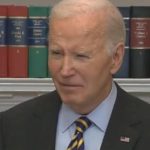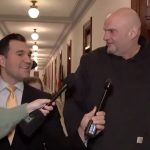AP Photo/Pablo Martinez Monsivais
- Pfizer CEO Albert Bourla effectively closed the door Tuesday on knowing whether or not its experimental coronavirus vaccine would work by the end of October.
- On the New York pharma giant’s third quarter earnings call, Bourla acknowledged the company has not yet started the first interim analysis for this final study, called a phase-three trial.
- Additionally, the CEO said it typically takes five to seven days for an independent board of scientists to complete that review.
- With four days left in October, that likely precludes a possible result coming this month.
- In September, Bourla set public expectations for an October data readout, a timeline at odds with top government scientists like Dr. Anthony Fauci and Moncef Slaoui, Operation Warp Speed’s chief scientist.
- Instead, Bourla asked on Tuesday for patience, as the study progresses.
- For more stories like this, sign up here for Business Insider’s daily healthcare newsletter.
Pfizer is not on track to meet the ambitious public expectations it laid out last month, as effectiveness data for its coronavirus vaccine candidate are unlikely to arrive in October.
Pfizer CEO Albert Bourla acknowledged on a Tuesday call with Wall Street analysts that an interim analysis of data from this pivotal clinical trial has yet to begin. It typically takes five to seven days to complete that review, Bourla added, a timeline that all but ensures the public won’t know this month if Pfizer’s COVID-19 shot works or not.
“We just ask everybody to be a little patient,” Bourla said on the pharma giant’s third quarter earnings call.
Over the past few months, Bourla has prominently positioned Pfizer not just as a frontrunner in the crowded race for a COVID-19 vaccine, but the leader of the pack. In September, he appeared on The “Today” show and CBS’ “Face The Nation” to predict “we will have an answer by the end of October.”
While Bourla called this a prediction, he added the October timeline had a 60% or higher chance of happening based on Pfizer’s modeling. No other drugmaker has put forward such an aggressive timeline, with the closest being Moderna, whose CEO has pegged November as the most likely timing for results, with October being unlikely.
Experts thought that vaccine data in October was unlikely
The ambitious timeline aligned well with President Donald Trump’s repeated predictions of having success on a vaccine before Election Day. Top government scientists, including Dr. Anthony Fauci and Operation Warp Speed’s leader Moncef Slaoui, have questioned the likelihood of the October timeline.
An independent board of scientists will take the first look at the study’s data when there are 32 symptomatic COVID-19 cases among trial volunteers. The study has enrolled more than 42,000 people who randomly get either two doses of Pfizer’s shot or placebo injection.
Bourla confirmed Thursday that the study has not yet recorded 32 cases. Even when the study reaches that number, the vaccine must be highly efficacious to show a meaningful difference from the placebo group so early on. The trial will continue until 150 volunteers have COVID-19.
The FDA wants more data on how safe the vaccine is
In the past few weeks, however, career scientists at the US Food and Drug Administration were able to put forward minimum safety requirements for an emergency authorization that effectively prevented a COVID-19 vaccine from being OK’d before the election.
Pfizer’s trial will need to collect data into the third week of November to meet that safety requirement. Bourla said the company would announce any conclusive efficacy result — positive or negative — when it becomes available to the company, even if it comes before the safety data is ready to submit to regulators.
Wall Street analysts were keyed into the coronavirus vaccine program, peppering Bourla with questions on the trial’s latest progress. At one point on Thursday’s call, Pfizer’s CEO thanked a Wall Street analyst for asking a question unrelated to COVID-19.
Powered by WPeMatico






